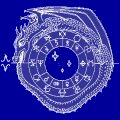Developmental : Astrology: A Religious View of the World
Astrology developed in a polytheistic age when there was a god or goddess for every occasion, action, etc. The Olympians were represented everywhere, in all areas of human activity and even in the sky - the planets were not seen as the gods themselves i.e. Jupiter the planet was not Jupiter the god but a representation which, in a horoscope, might describe the power of the god in an individual or an event. The planet is one reflection of the god.
This view of the world in a secular age seems quaint. We are so much more sophisticated, even one all-powerful God is something many find difficult to view as directly concerned with the affairs of man, let alone a pantheon of lesser deities. Where does such a notion fit in the modern world?
Yet I would claim that we all have experience of being possessed by one god or another. For example, to become absorbed in games like chess or bridge, computer games, solving puzzles, taking evening classes or reading are acts of worship at the altar of Mercury. The more you are absorbed the more are you possessed. Sexual fantasies, the pursuit of sexual pleasure, devotion to food or drink can be innocent, such as the wine buff exploring the pleasures of sex with a partner, but less so the alcoholic or the philanderer. These are devotees of Venus. The acolytes of Mars strive for strength, control, skill and precision. We all have felt the transforming power of Jupiter when we are in love - beyond lust and sexual pleasure - that openness that makes us more than ourselves.
Possession is dangerous, it can lead to obsession - blindness to other gods, but powerful also in the sense that it can make an individual super-human in some respect e.g. an athlete, a general (Mars), a martyr, self-sacrifice (Jupiter). If some aspect of your life is 'God' for you it is good to be able to recognise it. If you can also know that it is one god among many it may help you to avoid the pitfalls and become a more rounded individual, more fully human.
I have not as yet spoken of the brightest gods the Sun and the Moon. Probably most of us avoid the dangers of possession by being creatures of mood, pulled this way and that by concerns of the moment; at one instant our attention is caught by a twinge of hunger, the next by something on the TV or a problem that we are thinking about - flirting with one god then another, drifting on the tides of the Moon. She rules most of our waking lives.
Less often we are more truly aware of our surroundings, of what we are doing and why - we feel more truly ourselves, in control of our feelings, less easily distracted, clear, wide awake. Wake up now, look around at everyone else without judgement or fear. This is the Sun. From this place you can employ the skills of mind, the energy of desire, decisiveness and determination are available and you are capable of love in the fullest sense.
Yet this is still just a lesser god. The sources of knowledge, understanding and creativity lie further on. These are other gods, other planets beyond the reach of the naked eye; to reach them beyond our ordinary selves.
Astrology informs us of the uniqueness, sacredness, of every moment. It embodies a fund of wisdom about human nature and our relationship with the world around us, both seen and unseen. It can be nothing more than superstitious nonsense, but that depends on how you look and study, that is not its intrinsic nature. It is fun. It does develop one's insight into others. It can be much more.
C.T.
[Top]
© The Astrological Society

